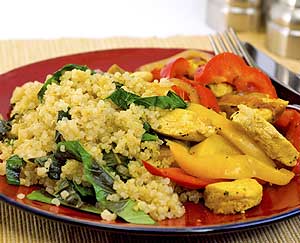Keep Body Fat Down with Whole Grains

The report, published in the American Journal of Clinical Nutrition, comes out of a large ongoing study called the Framingham Heart Study. Dietary information and abdominal fat measurements from 2,834 participants in the larger study were included in this report.
Whole grain eaters have less belly fat
For the dietary analysis, grains were put into two categories:
- Whole grains: Examples of these include whole grain cold cereals, porridge, brown rice and other cooked grains, dark bread, popcorn, and additional bran and germ.
- Refined grains: Examples of these include refined grain cereals, white bread, English muffins, bagels, biscuits, muffins, white rice, pasta, pancakes, waffles, biscuits, and pizza.
Measurements of the visceral fat were lower in whole grain eaters and higher in refined grain eaters:
- People with the highest whole grain intake (more than three servings per day) had the least visceral fat.
- People with the highest intake of refined grains (more than four servings per day) had the most visceral fat.
Adding whole grains is not enough
Before you start thinking that you need only add some whole grain servings to your day in order to reap their benefit, consider the following: the study also found that people who ate lots of both whole and refined grains did not see similar improvements in visceral fat measurements as people who ate lots of whole—but not refined—grains.
“These findings suggest that if individuals are already eating a few daily servings of refined grains, the inclusion of whole grains in the diet may not translate into lower amounts of visceral fat,” said lead study author Dr. Nicola McKeown of Tufts University in Boston. “Instead, efforts should be made to replace refined grains in the diet with whole grains.”
Making the switch
Here are some ways to replace refined grains with whole grains:
- Start with breakfast. Switch from sugary cold cereals to high-fibre whole grain cereals like shredded wheat, or experiment with hot cooked grains like porridge, buckwheat, or quinoa with some added fruit and nuts.
- Break the bread habit. Instead of a sandwich, have your lettuce, tomato and cheese, meat, or hummus with quinoa or brown rice and some dressing. If you really want a sandwich, use bread that lists whole grain flour as the first ingredient.
- Snack on popcorn. Treat yourself to a bowl of air-popped popcorn with olive oil and a little salt, chilli powder, and nutritional yeast, and forego the cookies and muffins. Lemon and garlic are another flavourful popcorn combination condiment.
- Choose whole grain pasta. Or better yet, choose one of the cooked whole grains like millet, unpearled barley, or brown rice.
While you’re at it, don’t forget about the other components of a heart-healthy diet: fruits, vegetables, nuts and seeds, pulses, and occasionally fish.
(Am J Clin Nutr 2010;doi:10.3945/ajcn.2009.29106)
Maureen Williams, ND, received her bachelor’s degree from the University of Pennsylvania and her Doctorate of Naturopathic Medicine from Bastyr University in Seattle, WA. She has a private practice on Cortes Island in British Columbia, Canada, and has done extensive work with traditional herbal medicine in Guatemala and Honduras. Dr. Williams is a regular contributor to TraceGains Newswire.
Copyright © 2024 TraceGains, Inc. All rights reserved.



 Lehmann&Voss&Co. and the LEHVOSS Group will be presenting their range of high-quality minerals at Food...
Lehmann&Voss&Co. and the LEHVOSS Group will be presenting their range of high-quality minerals at Food...  We are pleased to announce our new partnership with Zooca® The Calanus® Company for
We are pleased to announce our new partnership with Zooca® The Calanus® Company for 
 Calcium is well-known for its health benefits, especially for athletes and active individuals....
Calcium is well-known for its health benefits, especially for athletes and active individuals....  New
New 






































